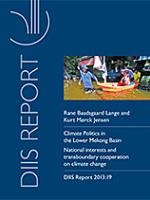DIIS Policy Brief
Climate Politics in the Lower Mekong Basin
Transboundary water cooperation, national development and commitment to climate action
Climate change is expected to intensify water security concerns in international river basins. The United Nations Framework Convention on Climate Change (UNFCCC) and donors have been important generators of political attention to the climate agenda among governments in the Lower Mekong Basin. The climate focus has been on regional cooperation, national policy-making and capacity building. However, while governments show commitment to the UNFCC negotiations, this is not necessarily reflected in the everyday business of domestic development.
The authors of this DIIS Report use a political economy approach firstly to understand when and how climate change becomes a national political priority for the governments of Laos, Thailand and Vietnam. And secondly, to understand how and when climate change gains importance for cooperation on transboundary waters.
The report investigates how distribution of climate hazards and vulnerabilities create different national risk perceptions and commitment to climate action. Donor funding and national development strategies are also strong drivers of both climate action and climate inaction. Climate change is sometimes used as a scapegoat for domestic policy failures and as a tool to acquire donor funding.
The authors recommend prioritizing climate action in the context of immediate development challenges and ‘no regrets’ interventions that are likely to enhance adaptive capacity and government commitment.
The authors of this DIIS Report use a political economy approach firstly to understand when and how climate change becomes a national political priority for the governments of Laos, Thailand and Vietnam. And secondly, to understand how and when climate change gains importance for cooperation on transboundary waters.
The report investigates how distribution of climate hazards and vulnerabilities create different national risk perceptions and commitment to climate action. Donor funding and national development strategies are also strong drivers of both climate action and climate inaction. Climate change is sometimes used as a scapegoat for domestic policy failures and as a tool to acquire donor funding.
The authors recommend prioritizing climate action in the context of immediate development challenges and ‘no regrets’ interventions that are likely to enhance adaptive capacity and government commitment.
Topics

Building commitments to climate action in the Mekong and Zambezi river basins
